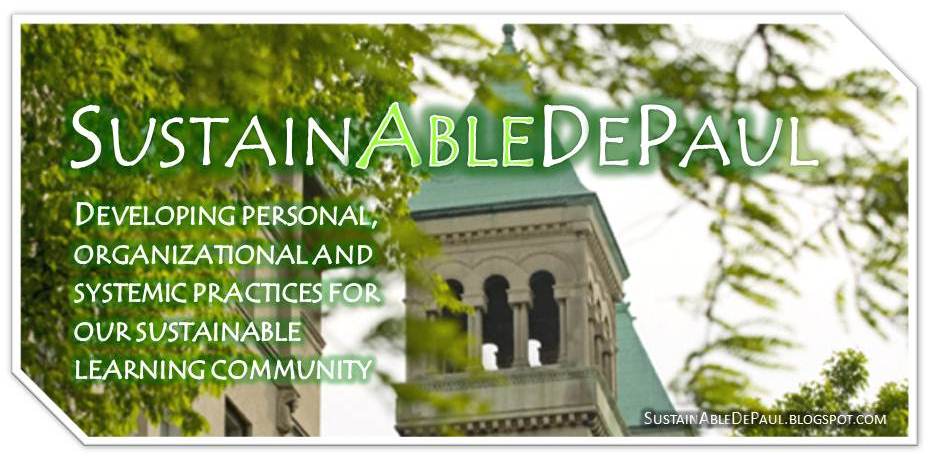The Sustainability Initiatives Task Force (SITF) began their journey with a question: In what ways does the focus on sustainability function to build DePaul’s capacity to be an agent of social transformation?
Two years later, it appears that we have an answer to that question and a plan of action. Last week, a faculty-wide letter from Rev. Dennis H. Holtschneider, CM announced the completion of the Institutional Sustainability Plan (ISP). An accompanying cover letter described the plan as “a baseline audit of activity and list of proposedrecommendations.”
This report is the first of its kind at the university and covers many facets of university life ranging from academics to operations. According to Barbara Willard, an environmental science and communication professor at DePaul, the task force was meant to get the ball rolling in regards to the ISP.
“We began working to come up with a strategy as to how to create a plan that was comprehensive, stressed all aspects of sustainability (as too often people narrowly see it as only environmental), and involve the DePaul community in the process,” said Willard.
In light of the recent student protests regarding tuition increases, the issue of how these applications fit into the budget becomes relevant.
While a “green fee” in tuition costs is typical at many universities, DePaul has yet to implement one. Student Government and the Environmental Concerns Committee have been working toward adding such a fee, which is generally around $10-$20 per quarter.
“It actually should make the university more economically sound because we will see long-term savings due to conservation of energy, water, and resources,” said Willard.
Senior journalism major, Evan Taylor, said that she would not mind paying a fee at all.
“That’s a really small amount to contribute and I would be happy to pay it, as long as I knew exactly where the money was going,” Taylor said. “I love seeing the things like the water bottle refill stations that show exactly how many bottles we’ve saved.”
Jonathan Eiseman, senator for sustainability within Student Government, sees the SITF as critical to realizing the goals DePaul has set.
“Their role is one of establishing the language that DePaul will use to communicate the changes that will take place in the future,” said Eiseman. “They determine the most plausible, economically efficient, and ecologically sound procedures for becoming the most sustainable urban campus.”
The task force is comprised of four “working groups”: curriculum, operations, research and engagement. Each group worked to isolate problems in their assigned areas and propose solutions that eventually made up the ISP that Fr. Holtschneider approved, according to Willard. Currently, the task force is working toward implementation of some of the proposed recommendations.
The SITF chose the Sustainability Tracking Assessment and Rating System (STARS) that was created by the Association for the Advancement of Sustainability in Higher Education as their measurement standard for creating a baseline to work up from.
Additionally, Housing Service’s “Green Team” attempts to promote sustainable living and environmental awareness across campus, another testament to DePaul’s commitment. As popular as environmentalism has become, Green Team supervisor, Cecelia Jacobson, said that it is certainly not a passing trend.
“All of the new DePaul buildings are LEED (Leadership in Energy and Environmental Design) certified -- which isn’t easy,” said Jacobson. “I believe that it is now policy to build our new projects within those guidelines.”
The Green Team and their “eco reps” host events across campus that increase the knowledge of sustainability in the residence halls and campus buildings.
“We hope that the impact we make on students will stick with them throughout the rest of their lives,” said Jacobson.
Eiseman confirmed DePaul’s policy of LEED certification and offers a long-term perspective of the commitment the university has made.
“The students who are involved with ‘greening’ our campus seem very committed to realizing these changes,” said Eiseman. “However, their time at DePaul is short in comparison to the strategic plan – and even shorter when comparing them to faculty and staff who have been and will be here for a good chunk of time.”
The next phase of the plan is the creation of a DePaul Sustainability Network (DSN) that will serve as a campus-wide group “working to sharpen, reshape and implement some of the recommendations contained in the ISP” in an effort to improve.
“The faculty members heavily involved in the DSN and SITF are amongst the most committed toward seeing these institution-wide changes take place in a reasonable amount of time,” Eiseman said.
Published at http://www.depauliaonline.com/news/new-sustainability-initiative-in-motion-1.2841603#.UCWTsGOe7iY




